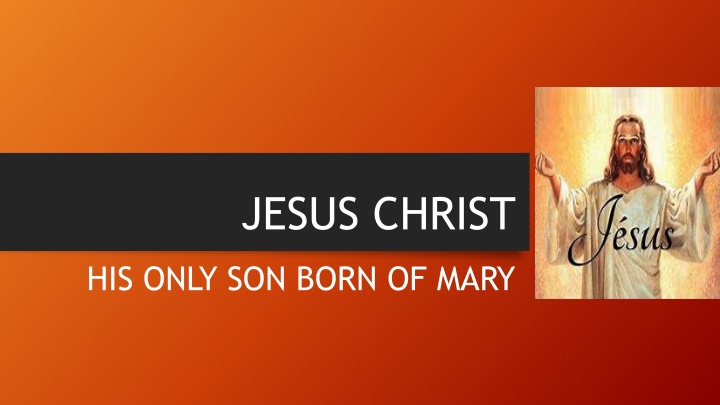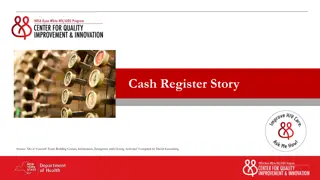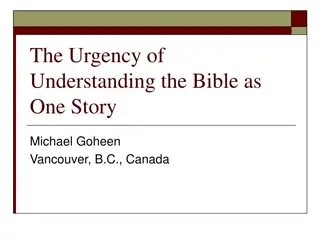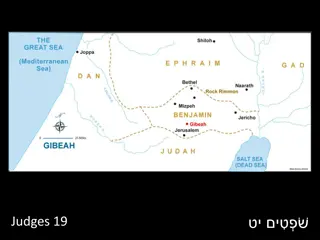
Significance of Jesus Christ in Christian Belief
Explore the profound belief in Jesus Christ as the eternal Son of God, born of Mary in Bethlehem, who died for humanity's sins and rose again. Learn about the power and importance of invoking the name of Jesus, the meaning of the title "Christ," and the four key aspects of faith related to Jesus Christ.
Download Presentation

Please find below an Image/Link to download the presentation.
The content on the website is provided AS IS for your information and personal use only. It may not be sold, licensed, or shared on other websites without obtaining consent from the author. If you encounter any issues during the download, it is possible that the publisher has removed the file from their server.
You are allowed to download the files provided on this website for personal or commercial use, subject to the condition that they are used lawfully. All files are the property of their respective owners.
The content on the website is provided AS IS for your information and personal use only. It may not be sold, licensed, or shared on other websites without obtaining consent from the author.
E N D
Presentation Transcript
JESUS CHRIST HIS ONLY SON BORN OF MARY
Jesus - God's Gift in Time's Fullness We believe that Jesus of Nazareth, born of Mary at Bethlehem, who died on the cross in Jerusalem under Pontius Pilate, is the eternal Son of God made man. He "came from God, , "descended from heaven, and is the "Word made flesh who dwelt among us. We have seen his glory as of the only Son from the Father" and from his fullness we have all received grace upon grace.
Seeing God's Plan in Christ Preached by Eyewitnesses Catechesis must "reveal the whole purpose of God's design in the Person of Christ. Catechesis must put people in union with Christ, who alone "can lead us to the love of the Father in the Spirit" (Second Vatican Council). Everything in catechesis must be taught in reference to Christ. The catechist must say: "My teaching is not mine, but his who sent me" The early disciples were eager to "speak of what we have seen and heard, and they invited people into their unity in Christ. "That which was from the beginning... we proclaim also to you, so that you may have fellowship with us"
Four Parts This faith in Jesus Christ will be explained according to four parts: 1. The titles of Christ 2. His Incarnation 3. His Paschal Mystery 4. His Glorification
HIS ONLY SON OUR LORD The Name Jesus The Power of the Name Invoking the Name Jesus (in Hebrew) means "God saves." The angel Gabriel told Mary "You shall name him Jesus. The angel told Joseph to name the child "Jesus, because he will save his people from their sin . Besides delivering Israel from Egypt, God made them aware of their sins so they would invoke him as their Redeemer. After the Resurrection, Jesus is the "name which is above every other name. Devils feared this name. Disciples performed miracles in this name, and the Father granted all petitions in Jesus' name. Liturgical prayers end with the words "through our Lord, Jesus Christ." The high point of the Hail Mary is Jesus' name. Jesus means "God saves" and all can invoke his name. "There is no other name under heaven by which we must be save. Once a year, the high priest sprinkled sacrificial blood and invoked the name of the Savior God in atonement for Israel's sins. Paul writes that God put forward Jesus "as an expiation by his blood.
The Name "Christ" "Christ" is the Greek translation of the Hebrew word "Messiah" or "Anointed," consecrated for God's mission. Jesus the Messiah, who would inaugurate God's Kingdom, had to be anointed by the Spirit. The angels announced to the shepherds a "Savior who is Christ the Lord. Jesus is "the one whom the Father consecrated and sent to the whole world. God told Joseph to take Mary as his wife so that Jesus would be of the messianic lineage of David.
The Anointed Messiah Because the Father anointed him with the Holy Spirit (who is the anointing) Jesus is the Christ (the anointed one). This eternal messianic consecration was revealed years later when Jesus was baptized by John and later explained by Peter: "God anointed Jesus of Nazareth with the Holy Spirit that he might be revealed to Israel. Many people called Jesus the Messiah. Because of political connotations, Jesus accepted this only with reserve. However, when Peter professed him as MessiaH, Jesus revealed his messianic kingship. Jesus is the "Son of Man who came down from heaven, who is called "to give his life as a ransom for many. After Jesus' Resurrection, Peter said "God has made him both Lord and Christ.
"Son of God" - A Human Title In the Old Testament, the title "son of God" (denoting an intimacy with God) was given to angels, the children of Israel and to kings. Therefore, those who called Jesus "son of God" were not implying that Jesus was more than human.
A Divine Sonship Peter said, "You are the Christ, the Son of the living God. Jesus said that this was revealed by his heavenly Father. Paul said that God "was pleased to reveal his Son to me, and Paul proclaimed in the synagogues that Jesus "is the Son of God." In these instances, Peter and Paul were speaking of Christ's divine sonship, the very center of apostolic faith. Jesus clearly distinguished his sonship from others. He always said "my Father" and only in prayer taught the disciples to say "Our Father." After his Resurrection he emphasized this when he said to Mary Magdalene "my Father and your Father.
The Father's Voice At Jesus' Baptism and Transfiguration the Father designated Jesus as his "beloved Son. When Jesus called himself the "only Son of God, he affirmed his eternal preexistence. The Centurion's words "Truly this man was the Son of God" is a Christian profession of faith. Only after the Resurrection can the believer give "Son of God" its full meaning. By his Resurrection Jesus was "designated Son of God in power. The apostles confessed "We have beheld his glory, as of the only Son from the Father.
The Name "Lord" In the Old Testament, Kyrios (the Greek word meaning "Lord'") indicated the divinity of Israel's God. This word Kyrios ("Lord") is used in the New Testament for the Father and for Jesus, thereby recognizing Jesus as God. Jesus showed his divine sovereignty by his power over illness, death and Satan. When people gave Jesus the title "Lord" they recognized a divine mystery of Jesus.
The Post-Resurrection Meaning Thomas said, "My Lord and my God, a title of adoration. The disciples said, "It is the Lord, a title of affection. By calling Jesus "Lord," the New Testament affirms that the honor due to the Father is also due to Jesus because he "was in the form of God. Jesus was made man "for our salvation." The Word became flesh to reconcile us with the Father. "As captives, we awaited a Savior; as prisoners, help; as slaves, a liberator. Did not these things move God to descend to human nature?" (St. Gregory of Nyssa). God sent his Son "so we might live through him, and so we "should not perish but have eternal life. Believing in Christ's unique lordship, Christians refused to submit totally to any earthly power. Caesar was not "the Lord" because "the kingdom of the world now belongs to our Lord and to his anointed. The purpose of all human history is Jesus, the world's Lord and Master. Jesus is our model. He said "Learn from me. The Father commanded us to "Listen to him.
Becoming Flesh The Incarnation The Unique Christian Belief Our Gift By becoming flesh, Jesus made us "partakers of the divine nature. "The Word became man so that man might become a Son of God" (St. Irenaeus). "For the Son of God became man so that we might become God" (St. Athanasius). Jesus "assumed our nature, so that he, made man, might make men gods" (St. Thomas Aquinas). The distinctive sign of the Christian faith is belief in the Incarnation. God's Spirit reveals to the believer "that Jesus Christ has come in the flesh. God "was manifested in the flesh. The Church calls Jesus' assuming a human nature the Incarnation. Jesus "took the form of a servant, being born in the likeness of men.
TRUE GOD AND TRUE MAN Gnostic Docetism Heresies about Jesus Jesus Christ is not part God and part man, nor is he a confused mixture of the divine and the human. The Church fought these heresies by clarifying the truth that Jesus Christ is true God and true man. The first heresies (Gnostic Docetism) denied Jesus' true humanity. However, the Church taught that God's Son had truly "come in the flesh." Jesus is Son of God by nature and not by adoption (Council of Antioch). Later, Arius said that Jesus was "from another substance" than that of the Father. Against Arius, the Church declared that Jesus is "begotten, not made, of the same substance as the Father" (Nicea).
Jesus is Not a Human Person Jesus Had a True Human Nature The Monophysitism heresy claimed that Jesus' human nature ceased to exist when assumed by the divine person. However, the Church declared that Jesus "was begotten from the Father before all ages as to his divinity and in these last days... was born as to his humanity of the Virgin Mary, the Mother of God." In Christ, there are "two natures without confusion, change, division, or separation. (Council of Chalcedon). The Nestorian heresy said that Jesus is a human person who is joined to the divine person of God's Son. Against Nestorius, the Church said that in Christ there was only one person, the Divine Person who became man by "uniting to himself in his person the flesh animated by a rational soul." Mary was proclaimed "the Mother of God" because from her the Word received his body, animated by a rational soul. Therefore, "the Word is said to be born according to the flesh" (Ephesus).
Overstressing His Humanity Later heresies overstressed Christ's humanity and made it a personal subject. In contrast, the Church said that everything in Christ's human nature is attributed to his divine person as its proper subject, even his sufferings and death. "Jesus Christ is true God, Lord of glory and one of the Trinity" (Council of Constantinople). Jesus is inseparably true God and true man. "What he was, he remained and what he was not he assumed (Roman Liturgy). "O, only-begotten Son and Word of God, you... without change became man and were crucified" (Liturgy of St. John Chrysostom).
How Did Jesus Become Man? Jesus' "human nature was assumed, not absorbed". Therefore, the Church teaches the full reality of Christ's human body and human soul (with intellect and will). Yet, Christ's human nature belongs to the Son of God. Christ's actions in his human nature derive from "one of the Trinity." Jesus communicates to his human nature his own personal mode of existence in the Trinity. "The Son of God acted with a human will and loved with a human heart" (Second Vatican Council).
Son of God - Yet Man Jesus' Human Knowledge The heretic Apollinarius taught that Jesus had no human soul because it was replaced by the Word. Therefore, the Church declared that the Son assumed a rational, human soul which has true human knowledge. This human knowledge is limited and was used in an historical context. Jesus could "increase in wisdom" and could learn from human experiences because he took "the form of a slave. Knowing God's Plan By union with the Word, Jesus knew what pertains to God, especially in his immediate knowledge of the Father and in his divine penetration into men's secrets. Christ enjoyed a full understanding of the eternal plan, which he came to reveal. He didn't know what he was not sent to reveal.
Having Two Wills Seeing God Through Jesus' Body Christ possessed two wills, divine and human. These are not opposed to each other. They cooperate so that the Word made flesh willed humanly all that he had already decided divinely with the Father and the Holy Spirit. Christ's human will "submits to his divine and almighty will" (Third Council of Constantinople). Christ's body, being truly human, was finite. Therefore, his human face can be portrayed in images (Second Council of Nicaea). Through Jesus' body "we see our God made visible and are caught up with love of the God we cannot see" (Christmas Preface). The believer "who venerates the icon, is venerating in it the person depicted" (Second Council of Nicaea).
Importance of the Sacred Heart "The Son of Man knew me and gave himself for me" (Gal 2:20) Because Jesus loved every person with a human heart, the Sacred Heart of Jesus is rightly considered the chief sign of his love for all human beings. (Pius XII - Encyclical on the Sacred Heart)
Mary Conceives By the Spirit The Annunciation begins. Mary conceived Jesus in whom the "whole fullness of deity" dwells "bodily." To Mary's question, "How can this be, since I do not know man?" the angel replied, "The Holy Spirit will come upon you. By the Spirit, Mary conceived the eternal Son of the Father in a humanity drawn from her own. This Son of the Father is the Christ, anointed by the Spirit from the beginning. This anointing was progressively revealed because his whole life manifested how "God anointed Jesus of Nazareth with the Holy Spirit and with power.
Mary's Prerogatives The Church's teaching about Mary illumines our faith about Christ. In preparing a body for Jesus God wanted a creature's free cooperation. He chose Mary (a daughter of Israel and a virgin betrothed to Joseph) to be his Son's mother. A woman (Eve) had shared in the coming of death, so a woman should share in the coming of life (Second Vatican Council).
Conceived without Sin Redeemed by Christ's Merits Mary was enriched with gifts appropriate to her call. She was "full of grace. Over the centuries, the Church realized that this "full of grace" meant that Mary was redeemed from the first moment, her Immaculate Conception. Mary, "from the first moment of her conception by the merits of Jesus Christ, was preserved immune from all stain of original sin" (Pope Pius IX). By Christ's merits, Mary "is redeemed in a more exalted fashion" (Second Vatican Council). The Father blessed Mary "in Christ with every spiritual blessing" and chose her "in Christ before the foundation of the world, to be holy and blameless. The Eastern Church calls Mary "the All-Holy" and says that she is "free from any stain of sin... formed as a new creature." By God's grace, Mary remained free of personal sin throughout her life.
Total Gift of Self Truly - The Mother of God Mary responded with the obedience of faith. "Behold, I am the handmaid of the Lord, let it be done to me according to your Word. She gave herself entirely to the person and work of her Son. Church writers call Mary "the Mother of the living." "Death came through Eve, but life through Mary (St. Jerome)." She is seen as "the mother of Jesus." However, Elizabeth, moved by the Spirit, rightly calls Mary "the mother of my Lord" because she conceived the second person of the Holy Trinity. The Church proclaimed that Mary is truly Mother of God, "Theotokos" (Council of Ephesus).
Conceiving Yet Remaining a Virgin The Church has always taught that Jesus was conceived "by the Holy Spirit without human seed" (Lateran Council). This virginal conception was the sign that Jesus was truly the Son of God. He is "truly of the race of David according to the flesh, Son of God according to the will and power of God, truly born of a virgin" (St. Ignatius of Antioch). This virginal conception is beyond human understanding. Joseph had to be told, "that which is conceived in her is of the Holy Spirit. . Isaiah had prophesied: "Behold, a virgin shall conceive and bear a son. Faith in Jesus' virginal conception met with lively opposition from Jews, unbelievers, and pagans (St. Justin). This opposition shows that the virginal conception was not some adaptation of a first century belief. Mary's virginity, her giving birth to Jesus, and the Lord's death are three mysteries which were "accomplished in God's silence" (St. Ignatius). In giving birth, Mary's real and perpetual virginity was not diminished but was sanctified (Second Vatican Council). Sometimes the Bible mentions brothers and sisters of Jesus. The Church has always seen these "brothers and sisters" as not being other children of Mary. In fact, Matthew speaks of "his brothers James, Joseph" who are actually the sons of "the other Mary.
God's Plan for Mary A New Era Begins Why Born of a Virgin? The virgin birth highlights Christ's person and his redemptive mission. Mary's virginity shows God's absolute initiative in the Incarnation. Because Jesus has only God as Father, "he is properly Son of the Father in both natures" (Council of Friuli). Jesus is conceived by the Holy Spirit because he is the new Adam, "a life- giving spirit." He is the "man from heaven." From his conception, God gave to Jesus' humanity "the Spirit without measure" (Jn 3:34) so that "from his fullness, we can all receive" (Jn 1:16). By his virginal conception Jesus begins a new era, namely, the birth of children adopted by the Holy Spirit through faith. This new life comes not from "the will of the flesh nor the will of man, but of God. Accepting this new life is virginal, a gift from the Spirit. Mary's virginity is a sign of her own faith. As both virgin and mother, Mary is a perfect symbol for the Church who receives God's Word in faith and brings forth children in the Spirit.
Mysteries of Christs Life The Creed says nothing explicitly about Jesus' hidden or public life. Because all that Jesus did and taught is important, catechesis uses the Gospel stories. We study three things: 1. Elements common to all the stories 2. A sketch of Jesus' hidden life 3. A sketch of Jesus' public life
The Mystery at Work in the Stories Stories That Reveal the Mystery The Gospels do not record every event of Jesus' life (even of his public ministry). The stories were written so we "may believe that Jesus is the Christ, the Son of God" and therefore, "have life in his name. The four evangelists had faith in Jesus and wanted to share their faith. They recorded Jesus' deeds, miracles, and words to reveal that in him "the whole fullness of deity dwells bodily. His humanity was a "sacrament," a sign and instrument of our salvation. His earthly life led to the invisible mystery of his divine sonship and redemptive mission. All of Jesus' words and deeds are a revelation of his Father. "Whoever has seen me has seen the Father. Jesus always did his Father's will and his life shows "God's love among us. Christ's whole life is a mystery of redemption, which comes primarily through his death on the cross. This mystery is at work in his poor birth, his hidden life of obedience, his purifying word, his miracles and exorcisms, and in his Resurrection. In all his words and deeds, Jesus aimed at restoring fallen man to his original vocation. "When Christ became incarnate, he procured for us a short cut' to salvation. What we lost in Adam, we might recover in Christ Jesus" (St. Irenaeus).
We Share His Riches Christ's riches are for everyone. He lived and died "for us men and for our salvation. He is still "our advocate before the Father for he "lives to make intercession for us. Jesus invites us to be his disciples and to follow him. By becoming a man, Christ enables us to live in him. "We must continue to accomplish in ourselves the stages of Jesus' life" (St. John Eudes).
Jesus Infancy and Hidden Life God prepared the world for his Son's coming. God had the prophets announce Jesus. God even awakened expectation in pagan hearts.
The Prophets and John the Baptist Our Christmas Mystery John the Baptist surpassed "all the prophets, of which he was the last." Even in his mother's womb, he announced Christ's presence. Later, he rejoiced as the "friend of the bridegroom" and went before Jesus "in the spirit and power of Elijah. The Advent liturgy highlights John's martyrdom and instills in us his words: "He must increase, but I must decrease. In the poverty of Jesus' birth (witnessed first by shepherds) heaven's glory was manifested. "The virgin today brings into the world the Eternal and the earth offers a cave to the Inaccessible" (Romanus the Melodist). Becoming a child (the condition for entering the Kingdom) demands being "born from above. Christmas is fulfilled when Christ is formed in us. "We have been made sharers in the divinity of Christ who humbles himself to share our humanity" (Antiphon for January 1st liturgy).
The Three Wise Men The Circumcision Encounter in the Temple Jesus' circumcision on the eighth day is the sign of his submission to the law and his future participation in Israel's worship. This sign prefigures the sacrament of Baptism. The Epiphany event (which includes the wise men, Jesus' Baptism, and the wedding feast of Cana) manifests Jesus as Israel's Messiah, the Son of God and Savior of the world. The Magi represent the pagan nations who will welcome the Gospel. By their coming to Jerusalem, they correctly seek in Israel the king of the nations. Only by turning toward the Jews can the pagans discover Jesus. All the nations are part of the "family of the patriarchs" and "worthy of the heritage of Israel" (St. Leo the Great). By his presentation in the temple, Jesus is manifested as the first born who belongs to the Lord. His "encounter" (the name used in Byzantine tradition) with Simeon and Anna symbolizes the recognition of Jesus as "light of the nations" and "the glory of Israel." Mary's sorrow prefigures Christ's death which will be a salvation "for all the peoples. Fleeing to Egypt The massacre of the innocents causes Jesus' flight into Egypt and shows the opposition of darkness to the light. "His own people received him no. His return from Egypt recalls the exodus and shows Jesus as the definitive liberator of God's people.
Thirty Years of Obedience For thirty years, Jesus engaged in manual labor and lived as a Jew obedient to God's law. He was "obedient" to his parents and "grew in wisdom and in stature and in favor with God and man. Jesus' obedience was an image of his obedience to his heavenly Father and anticipated his obedience in the Garden. Through obedience, he restored what Adam's disobedience had destroyed. By our daily ordinary actions, we enter into fellowship with Jesus. "Jesus' home in Nazareth is a school, teaching us the value of silence, family life, and the redeeming law of human work" (Pope Paul VI). Jesus' staying behind in the temple (the only recorded event of his hidden life) showed his total consecration to his divine mission. His parents did not fully understand Jesus' reply, "Did you not know that I must be about my Father's work?"
Jesuss Public Life Getting Baptized Anointed for His Mission Buried with Him By this Baptism, Jesus accepts his mission as God's suffering servant. He is the "Lamb of God" and his Baptism anticipates his bloody death which will take away the sin of the world. The Father delights in his Son and the Spirit (already fully possessed by Jesus) comes to "rest on him" showing that Jesus will be the source of the Spirit. The heavens (closed by Adam's sin) "were opened" and the water was sanctified (a prelude to the new creation). Jesus' public life began while John was preaching a "Baptism of repentance." Suddenly, Jesus appears and wants to be baptized. When Jesus receives John's Baptism, the Father says, "This is my beloved Son, and the Spirit, in the form of a dove, comes upon Jesus. This manifests Jesus as both Messiah of Israel and Son of God. By descending into the baptismal water, Christians enter into this mystery of Christ's death and become the Father's beloved sons. "Let us be buried with Christ by Baptism to rise with him" (St. Gregory of Nazranzus). "After the bath of water, the Holy Spirit swoops down upon us and we become sons of God" (St. Hilary of Poitiers).
Faithful in the Desert Immediately, the Spirit leads Jesus into a forty day fast in the desert. This period concludes with three diabolical temptations which recapitulate the temptations of Adam in Paradise and of Israel in the desert. Jesus rebuffs these attacks and does not compromise his filial attitude toward the Father. These events reveal Jesus as the new Adam. He also fulfills the vocation of Israel (who was not faithful during their forty years in the desert). In these forty days, Jesus anticipates the full victory of his Passion when he will conquer the devil, bind him, and take back his plunder. Jesus does not accept Satan's proposed definition of his Messiahship. By overcoming these temptations, he is able "to sympathize with our weaknesses," like us "in everything but sin.
Everyone's Kingdom - Especially for the Poor and Sinful This Kingdom is for everyone. God's Word is a seed which exerts its full power within the believer (Second Vatican Council). This kingdom belongs especially to the poor, because Jesus "preaches the Good News to the poor. This includes the "little ones" with whom the Father is pleased. By experiencing hunger and privation, Jesus shared in poverty. He identified himself with the poor, and made love for the poor a condition for entering the kingdom. Jesus invites all sinners. He shows the Father's boundless mercy and the vast joy in heaven "over one sinner who repents.
Setting People Free Need for a Choice Miracle Power In freeing people from illness, hunger and death, Jesus performed messianic signs. His primary task, however, was to free men from sin (the greatest slavery) which causes all forms of human bondage. Jesus' Kingdom means Satan's defeat. Driving demons out of some people (exorcisms) anticipates Jesus' full victory on the cross over the "ruler of this world. Through his parables, Jesus invites his hearers to enter the kingdom. He asks them to make a radical choice. ("He sells all that he has and buys that field. The kingdom requires deeds and the use of God's talents. The parables contain the secrets of the kingdom. Only a person inside the Kingdom can understand their message. Jesus' words are accompanied by miracles which manifest the Kingdom. These miracles show that he was sent by the Father and they invite people to believe in him as the Son of God. In spite of miracles, some people reject Jesus. Others claim that his power comes from Satan.
Choosing the Twelve Jesus chose twelve apostles, shared his authority with them and "sent them out to preach the Kingdom of God and to heal. They will always be associated with his kingdom because through them Jesus directs his Church. Jesus promised them that they would "sit on thrones judging the twelve tribes of Israel.
Placing Peter at the Head After Peter proclaimed "You are the Christ, the Son of the living God, Jesus bestowed special authority upon him: "You are Peter, and on this rock I will build my Church and the gates of Hell will not prevail against it. Peter will always remain the unshakeable rock of the Church who strengthens his brothers. Jesus gave Peter special authority. "I will give you the keys of the Kingdom of heaven, and whatever you bind on earth shall be bound in heaven, and whatever you loose on earth will be loosed in heaven. "To bind" and "to loose" mean authority to forgive sin, to define doctrines, and to make disciplinary decisions in the Church. Jesus entrusted this authority to the Church through the apostles and in particular, through Peter, to whom he specifically entrusted the keys of the kingdom.
Transfigured before Them Jesus said he would suffer, "be killed and on the third day be raised. The apostles did not understand these words. Therefore, Jesus chose Peter, James, and John to come to a high mountain, to see his face and clothes become dazzling with light. They saw Jesus speak with Moses and Elijah, and heard the Father say, "This is my Son, my Chosen; listen to him.
Disclosing His Glory By this action, Jesus disclosed his divine glory and revealed his death in Jerusalem. He showed that he fulfilled the law (symbolized by Moses) and the prophets (symbolized by Elijah). "The Trinity was present: the Father as the voice; the Son in a man; the Spirit in a shining cloud" (St. Thomas Aquinas). "Your disciples saw your glory, so they would understand that your passion was voluntary" (Byzantine Transfiguration Liturgy). Jesus' Baptism proclaimed our own Baptism. His transfiguration proclaimed our resurrection when Christ "will change our lowly body to be like his glorious body. Unfortunately, Peter's desire to remain on the mountain shows he still did not see the need for death before entering the kingdom (St. Augustine).
Toward Death in Jerusalem After that, Jesus "set his face to go to Jerusalem" (Lk 9:51) knowing that a prophet should not "perish away from Jerusalem. Jesus still loved Jerusalem and would gather her children "as a hen gathers her brood beneath her wings. He even wept over Jerusalem, wishing that the city "knew the things that make for peace. Jesus carefully chose the time and the details of his entrance into Jerusalem. By "riding on an ass" he fulfilled the prophecy. By his humility, he conquered the Daughter of Zion (a figure of the Church). The poor and children, like the angels at his birth, acclaim: "Blessed is he who comes in the name of the Lord."
Accomplishing God's Plan Jesus' death and Resurrection accomplished God's "once for all. This is the very center of the Good News proclaimed by the apostles. The Church faithfully proclaims Jesus' interpretation that he "should suffer these things and enter into his glory. Jesus was "rejected by the elders, the chief priests and the scribes" and was "handed over to the Gentiles to be mocked and scourged and crucified. Faith examines the circumstances of Jesus' death from the Gospels and other historical sources to better understand the meaning of redemption.
Reasons for the Accusations From the very beginning, certain groups agreed to destroy Jesus. Because Jesus expelled demons, forgave sins, healed on the Sabbath, gave novel interpretations to the law, and was friendly with public sinners, some ill-intentioned persons thought Jesus was possessed by a demon. He was accused of blasphemy, false prophecy, and religious crimes (which Jewish law punishes by stoning). Jesus' deeds were a "sign of contradiction" especially for Jerusalem's religious authorities (whom John calls "the Jews"). In contrast, Jesus' relationship with the Pharisees was not always polemical. He endorsed some of their teachings (resurrection from the dead, almsgiving, fasting, addressing God as Father, the centrality of love) and, on occasion, dined with them.
The Four Objections Four objections arose against Jesus' ministry: 1. Jesus seemed to be acting against some essential institutions of Israel 2. He did not submit to the whole written law or the Pharisaic interpretation 3. He did not accept the centrality of the Temple as God's holy dwelling place 4. He claimed a share in God's glory which is given to no man


















